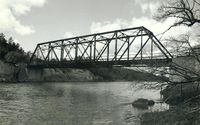Difference between revisions of "NRHP: Berry State Aid Bridge"
(Created page with "Berry State Aid Bridge == Berry State Aid Bridge== NRHP Reference #: 92000753...") |
|||
| Line 3: | Line 3: | ||
== Berry State Aid Bridge== | == Berry State Aid Bridge== | ||
| − | NRHP Reference #: 92000753 | + | NRHP Reference #: [https://npgallery.nps.gov/AssetDetail/NRIS/92000753 92000753] |
NRHP Listing Date: 19920629 | NRHP Listing Date: 19920629 | ||
Latest revision as of 09:04, 20 February 2018
Contents
Berry State Aid Bridge
NRHP Reference #: 92000753
NRHP Listing Date: 19920629
Location
10 mi NE of Valentine, Cherry County, Nebraska
View this property's location
View all NRHP properties on this map.
Summary
Built in 1899, the original Berry Bridge was one of four spans left intact over the Niobrara River after the disastrous 1916 flood. The county commissioners approached the Nebraska State Engineer regarding state or federal aid to replace this existing truss. State aid was approved in 1918. The Omaha based Pioneer Construction Company was awarded the contract and the Berry Bridge was completed in 1921. Meanwhile, the 1899 truss was moved some five miles east. The Berry Bridge, located northeast of Valentine is one of the few remaining trusses in Nebraska built under the state aid bridge system. It is significant as a well-preserved, long-span example of the riveted Pratt through truss; a mainstay structural type in the state in the 1910s and 1920s.
Further Information
Bibliography
About the National Register of Historic Places
The National Register of Historic Places (NRHP) is the country’s official list of historically significant properties. To be eligible for the NRHP a property must generally retain their historic appearance, be at least 50 years old, and have the potential to be documented as historically or architecturally significant at either the local, state, or national level. The National Register of Historic Places is a National Park Service program administered by the Nebraska State Historical Society for the state of Nebraska. Visit the Nebraska State Historical Society's website to learn more about the program.
